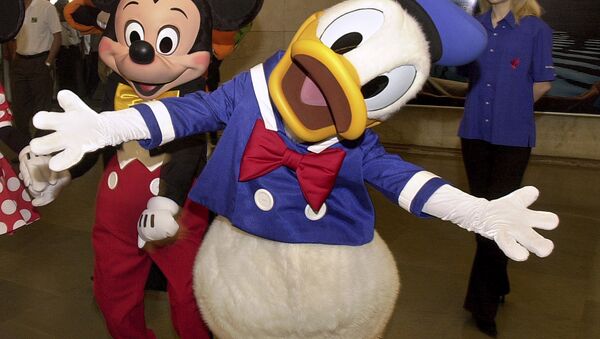Mickey Mouse is the undeniable face of Disney the world over, but in Germany, citizens young and old have a far more cantankerous cartoon hero — Donald Duck.
Dedicated comics featuring the duck — Lustiges Taschenbuch (Funny Paperback) have been sold in the country every since the 1960s, and remain among the bestselling cartoon titles in newsagents in 2017. The 500th edition was published this week.
The comic details the ongoing exploits of Donald and family — including his tight-fisted uncle, Scrooge McDuck, and three mischievous nephews, Huey, Dewey and Louie.
Donald Duck has a huge cult following in Germany. Belonging to the society “D.O.N.A.L.D”, members are 'Donaldists.' pic.twitter.com/HdBB66vK6a
— Seriously Strange (@SeriousStrange) August 28, 2015
Some older readers are quite so smitten with Donald they are referred to as "Donaldists," and have their own fan club, D.O.N.A.L.D.
This hardcore fanbase regularly gathers together in order to pore over the duck's latest comic adventures together, track the evolution of his cartoon rendering, and engage in speculative discussions about the nature of Donald's world, Duckberg.
Speaking to The Local magazine, Alexander Poth, a committed 46-year-old Donaldist, said he and his fellow duck devotees assume his hometown really exists, and "ask ourselves questions on all kinds of details from the adventures of the Duck family, which for us are not made-up stories but factual reports."
"All discrepancies in these reports are examined scientifically by our members, and the results are published in our trade magazine — ‘The Donaldist' — and presented and discussed at our annual congress," Poth stated.
Corrupting Youth
The stratospheric success of Donald Duck in Germany is somewhat miraculous. For one, the ever- miffed waterfowl was the centerpiece of the 1943 propaganda film Der Fuehrer's Face (AKA Donald Duck in Nutzi Land).
In it, Donald works in a small German town, where everything is shaped like a swastika, and everyone sings the virtues of Nazi doctrine at all times. Roused from bed in the morning via bayonets by Hitler, he eats an unpalatable breakfast of wooden bread, coffee brewed from a single bean, and a spray that smells like bacon and eggs, before being forced to read Mein Kampf in the remaining time before work.
He then begins a 48-hour shift at a local factory, screwing caps onto artillery shells in an assembly line — mixed in with the shells are portraits of the Fuhrer, which he must salute. The pace of the assembly line intensifies throughout the shift, making it difficult if not impossible for Donald to keep up. All the while, he is bombarded with propaganda messages about the superiority of the Aryan race and the glory of working for the Fuhrer. After suffering hallucinations and a nervous breakdown, it is revealed he was merely having a nightmare.
Perhaps as a result, in the post-war period, Disney comics were viewed with much suspicion, as they were first disseminated by occupying US troops — critics said they were responsible for increasing rates of crime among young people, and generally a corrupting influence on the nation's youth. Some feared they would turn younger generations off reading literature forevermore.
Even though picture books had existed in the country for many years by that point, text was typically printed below images. Comic books, which intertwined text and images and told fantastical stories featuring grotesque characters, were regarded as new and potentially dangerous.
The key to the duck sensation may lie in the decision of Erika Fuchs, the woman tasked with translating the first editions of Lustiges Taschenbuch into German, to site Duckburg in the southern region of Upper Franconia, complete with typical Bavarian farmhouses and bakeries.
Heute Morgen in Entenhausen — Erika Fuchs Haus #museum #franken #entenhausen #comic pic.twitter.com/IoGPOcc7m5
— meikemeilen (@meikemeilen) August 15, 2017
[Tweet: This morning in Duckburg — Erika Fuchs House]
She gave ducks German names and Germanic manners of speaking — the elderly Scrooge (Dagobert) is pedantic, and knows every single German verb conjugation, Donald swings between angry tirades and poetic verses drawn from the works of Schiller and Goethe.
Moreover, unlike Disney peer Mickey, Donald is a perennial loser — yet he is never fazed by failure, instead concocting yet another harebrained scheme whenever his previous madcap approaches fall short. His ineptitude and failings make him an endearing, likable figure.





